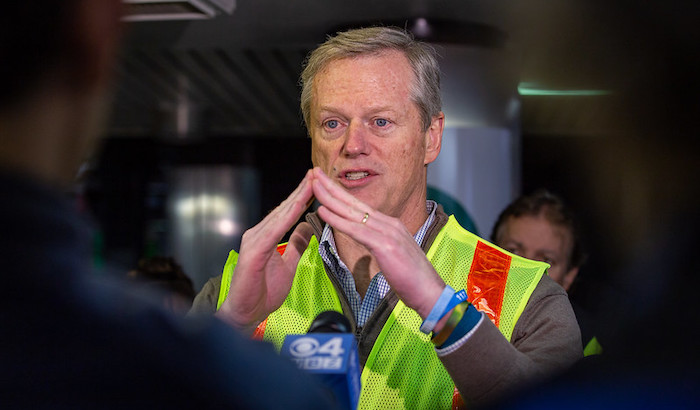
TV reporters look for silver lining in Orange Line misadventure
As Dig readers know well, we’re not big fans of many other media makers around here. It’s the role we play, the less-than-friendly foil, and it means that we can say things others in the industry will only whisper. Like that there’s nothing sillier than local Emmy awards since those acting in the role of newscaster on television commit daily crimes against the communities that they purport to serve. Like with their coverage of the MBTA crisis and looming Orange Line shutdown, for example.
It’s pretty clear that most of the hairdos on TV news don’t frequently ride trains and buses. They’re out here questioning the riders like they’re concertgoers facing an unfortunately long line at the merch table, as opposed to addressing the situation as what it truly is—a disaster that could have been avoided but that is instead now going to cost thousands of the region’s most vulnerable residents an incalculable amount of money as well as time that could have been spent with family and friends.
If I sound a tad too sentimental, then maybe you should try out for a gig reading insipid propaganda off a teleprompter.
Aside from tube hacks sticking microphones in the mugs of people whose opinions only make the five o’clock news cut if they can riff on the current public transit tragedy and deliver a denouement in seven or fewer seconds, the rest of the local press corps is performing pretty well considering industry-wide cutbacks and largely shit conditions. There’s still not nearly enough critical coverage for a mess of this magnitude, but the basics are being addressed.
From day-to-day updates via Universal Hub to T info dumps from the likes of Axios and Boston Magazine, those who can’t afford to get behind the Globe or Herald paywalls (a group that no doubt includes many post-pandemic commuters) have reasonable access to info that will help people navigate shuttles and detours from Aug. 19 to Sept. 19 (or whenever the shutdown actually ends).
There’s also solid reporting and commentary via Commonwealth and others on the politics surrounding the whole crisis; among other somewhat superficial but nevertheless worthwhile items, current attorney general and Democratic candidate for governor Maura Healey “released a transportation plan on Tuesday that would overhaul top management at the MBTA, set aggressive electrification goals, and establish low-income fares ‘with a pathway to fare free buses.” And it’s encouraging to see that political coverage extends beyond campaign chatter and the border of Boston; I especially recommend this GBH piece, “Local mayors and town managers still lack ‘clear answers’ from the MBTA ahead of Orange Line shutdown,” based on a Radio Boston interview with Medford Mayor Breanna Lungo-Koehn.
But what’s most interesting, and what everybody should be watching for over the next month, is the story of the day. In the leadup to the shutdown, trends have been solution-driven, which isn’t necessarily a bad thing. In the past two days, there have been loads of pieces on the accessibility of bikes and other alternative modes of transportation.
Alternatively, there’s been a lot of doom reporting, especially as video emerged of the runaway Red Line train from last month. Road and highway traffic also seems to be of particular concern to the TV yakkers; as WCVB put it, “MBTA Orange Line shutdown to create widespread travel impacts.”
No doubt about it, but it’s funny how you don’t see anybody cherry-picking drivers for a quick bite that makes it sound like everything is gonna be okay like they do when the subjects are suffering straphangers.
P.S. We’re on the case too, not only with tangential reports, snarky takes, and historical MBTA throwback articles, but also with more investigative reporting including a follow-up to our recent feature on how the T was spending millions on marketing its stellar trains and buses right up through the fires and announcement of the coming closure.
A Queens, NY native who came to New England in 2004 to earn his MA in journalism at Boston University, Chris Faraone is the editor and co-publisher of DigBoston and a co-founder of the Boston Institute for Nonprofit Journalism. He has published several books including 99 Nights with the 99 Percent, and has written liner notes for hip-hop gods including Cypress Hill, Pete Rock, Nas, and various members of the Wu-Tang Clan.

